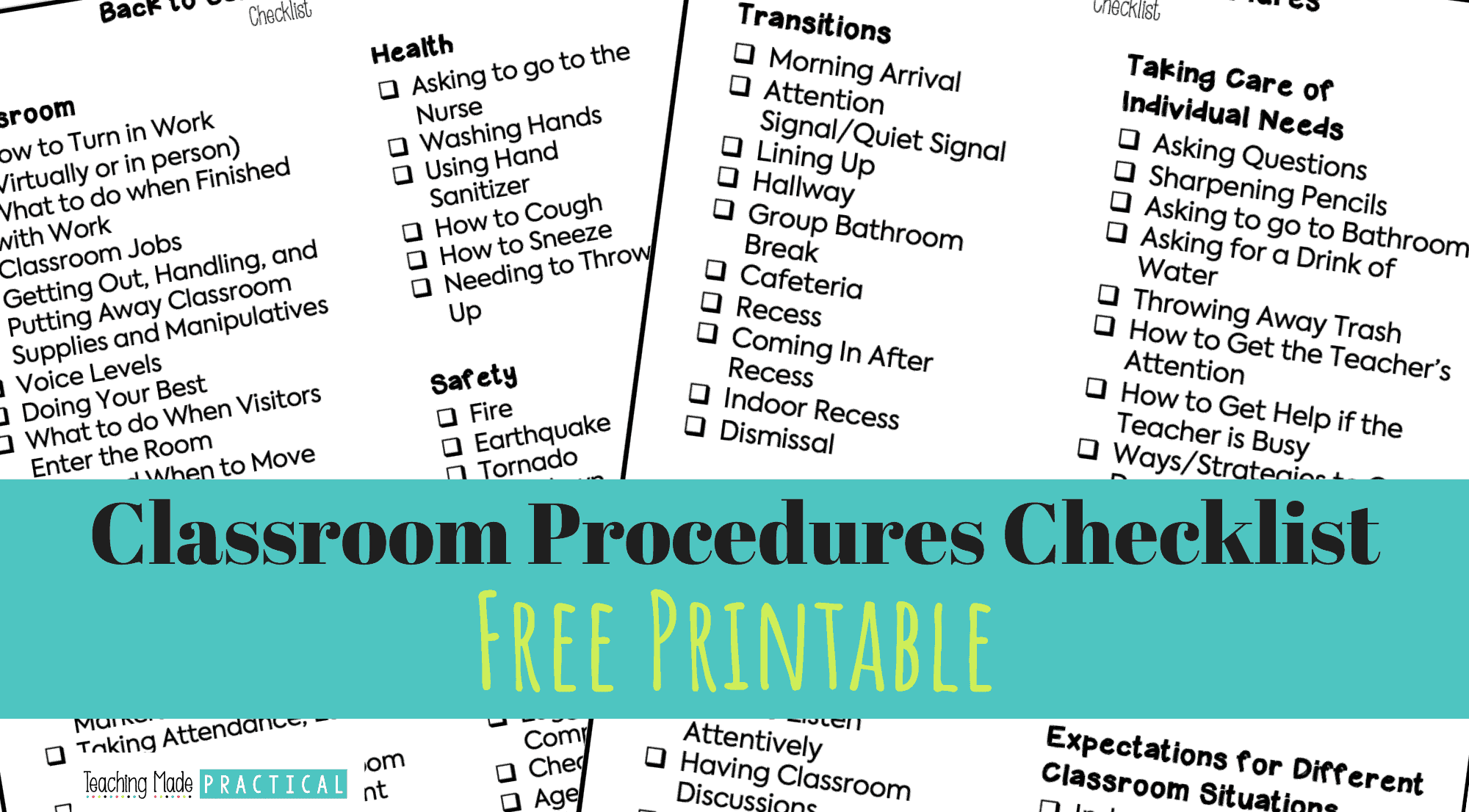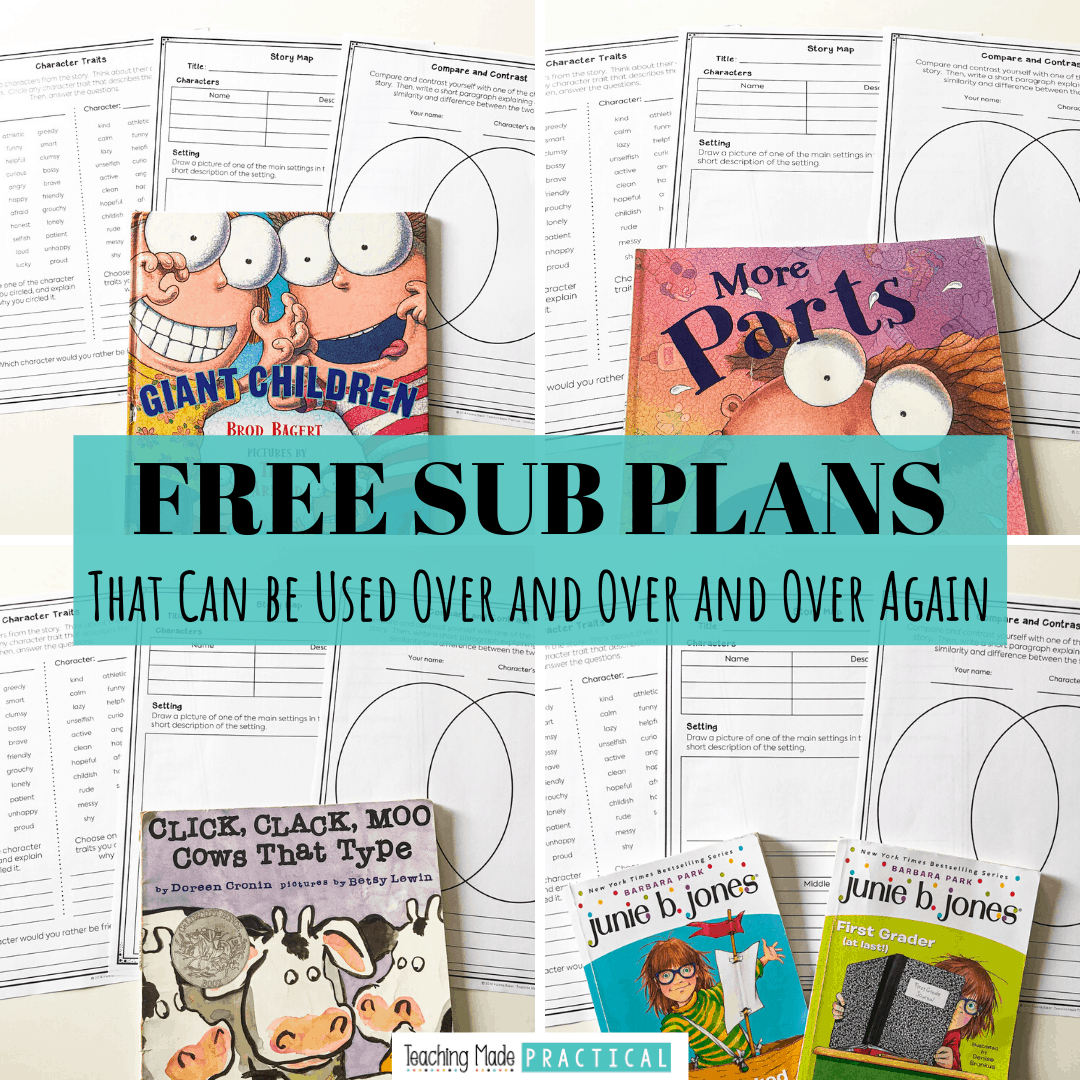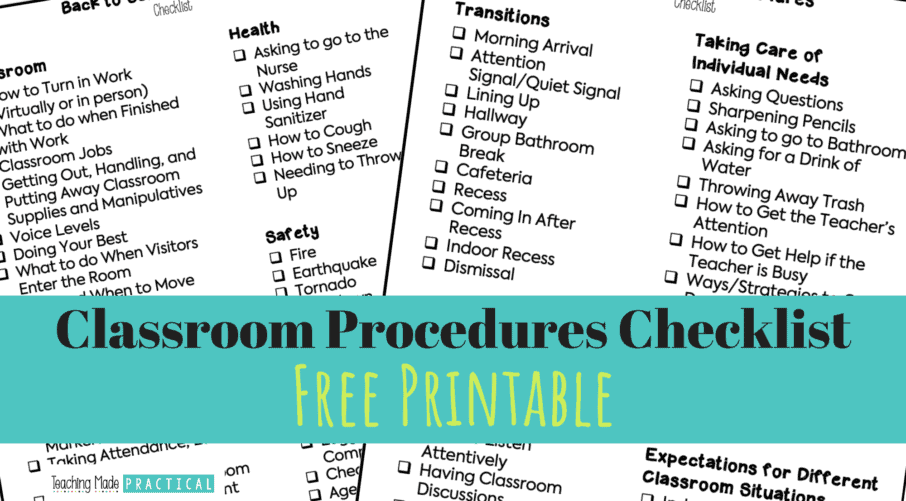
As a teacher, you know that your classroom can't run like a well-oiled machine unless students know what exactly what is expected of them those first few weeks of school. Use the list of classroom procedures and routines below to help you decide what procedures need to be taught as you head back to school this year.
Or, download this free pdf for a printable version:
Classroom Procedures Checklist Free PDF
You can find some examples and helpful tips for creating specific classroom procedures in your 3rd, 4th, and 5th grade classroom by clicking some of the links in the lists below.
Procedures for Transitioning
Upper elementary classrooms are in a constant state of transition. Having clear procedures for what to do during the various transitions throughout the school day can help you minimize the amount of time is wasted. It will also prevent behavior problems.
Some transition procedures you should consider are:
- Entering the Classroom / Morning Arrival
- An Attention Signal/Quiet Signal
- Lining Up
- Walking in the Hallway
- Taking Group Bathroom Breaks
- Cafeteria Expectations
- Recess Expectations
- Indoor Recess Expectations
- Coming Inside After Recess
- Dismissal
Procedures for Taking Care of Individual Needs
If you have 27 students in your class, then you have 27 different people that will be needing all sorts of things at different times throughout the day. Taking care of individual needs is one of the biggest disruptors of classroom learning.
Being clear about the expectations for different individual needs can help minimize disruptions. Consider coming up with hand signals for your classroom in order to help 3rd, 4th, and 5th grade students take care of necessary business without interrupting the class.
Think about what procedures and routines you want to set in place for:
- Asking Questions
- Sharpening Pencils
- Asking to go to the Bathroom
- Asking for a Drink of Water
- Throwing Away Trash
- How to Get the Teacher's Attention
- How to Get Help if the Teacher is Busy
- Ways/Strategies to Calm Down if Upset, Sad, Frustrated, etc.
- How to Fidget/Take Brain Break Without Distracting Others
- What to do in Case of an Emergency
Take the classroom outdoors with these fun outdoor scavenger hunts that cover a variety of skills. The 8 scavenger hunts include:
- 5 senses scavenger hunt
- nouns and adjectives hunt
- math review
- living and nonliving
- syllable sort
- ...and more!
Get 8 scavenger hunts for $2.00 and enjoy some sunshine with your students!
Procedures for Getting Along With Others
Taking the time to intentionally teach your students how to navigate relationships and deal with conflict will not solve all the behavior problems in your classroom, but it will help.
Think about what procedures you can set in place for:
- Disagreeing in a Kind Way
- How to Handle Conflict
- How to Listen Attentively
- Having Classroom Discussions
- How to Help Other Students
- Finding Partners
- Tattling Vs. Reporting
- How to Handle Bullying
- Celebrating Kindness
Don't leave routines for getting along with others off of your classroom procedures checklist!
Expectations for Common Classroom Situations
In certain situations, some behaviors are acceptable, while in other situations, these same behaviors are unacceptable. This can be incredibly confusing for students unless they are explicitly taught when things are acceptable and when they aren't.
Teach students what behaviors are allowable for each of these common classroom situations:
- Independent Work
- Partner Work
- Small Group/Centers
- Whole Group
- Carpet
- Silent Reading
- Guided Reading/Small Group Instruction
General Classroom Procedures
When students know exactly what is expected of them, your day will go more smoothly! Think about whether you need to set up procedures for:
- How to Turn in Work (Virtually or in Person)
- What to Do When Finished with Work
- Classroom Jobs
- Getting Out, Handling, and Putting Away Classroom Supplies/Manipulatives
- Voice Levels
- Doing Your Best
- What to do When Visitors Enter the Room
- How and When to Move Around the Classroom
- How to Organize Desk
- Food in the Classroom/Allergies
- Whiteboard and Dry Erase Markers
- Taking Attendance/Lunch Count
- Cleaning Up the Classroom
- What to Do When Absent
- Classroom Library Checkout
- Keeping the Classroom Library Clean
- Classroom Schedule
- How to Behave for a Sub (you might also find these tips for what to do the day after a sub helpful)
Procedures for Staying Healthy
COVID brought all sorts of health concerns into the limelight. Set up different procedures to help keep you and your students healthy.
Besides whatever COVID protocols your school has in place, think about setting up procedures for:
- Asking to go to the Nurse
- Washing Hands
- Using Hand Sanitizer
- How to Cough
- How to Sneeze
- Needing to Throw Up
Safety Procedures
We all hope it will never happen, but that doesn't mean we shouldn't be prepared.
Depending on where you live, some of these emergency procedures might not be necessary. Make sure your students know what to do in case of:
- Fire
- Earthquake
- Tornado
- Lockdown
- Emergency Evacuation
Other Procedures to Add to Your Classroom Procedures Checklist
Some other possible procedures to add to your classroom procedures checklist include:
- How to Take Care of Technology
- Logging into the Computer
- Checking Work
- Agendas/Planners
- Using Flexible Seating
- Recycling
- Putting Name, Number on Paper
Download a free pdf of this Classroom Procedures Checklist Free PDF.
Wondering how to practice these different procedures without students getting bored? Check out these 17 Fun Ways to Review Classroom Procedures.
Or, check out these other classroom management tips, strategies, and ideas.
Never Stress Over Sub Plans Again!

Make copies, find a fiction book, and you'll be ready for any emergency that comes your way!


